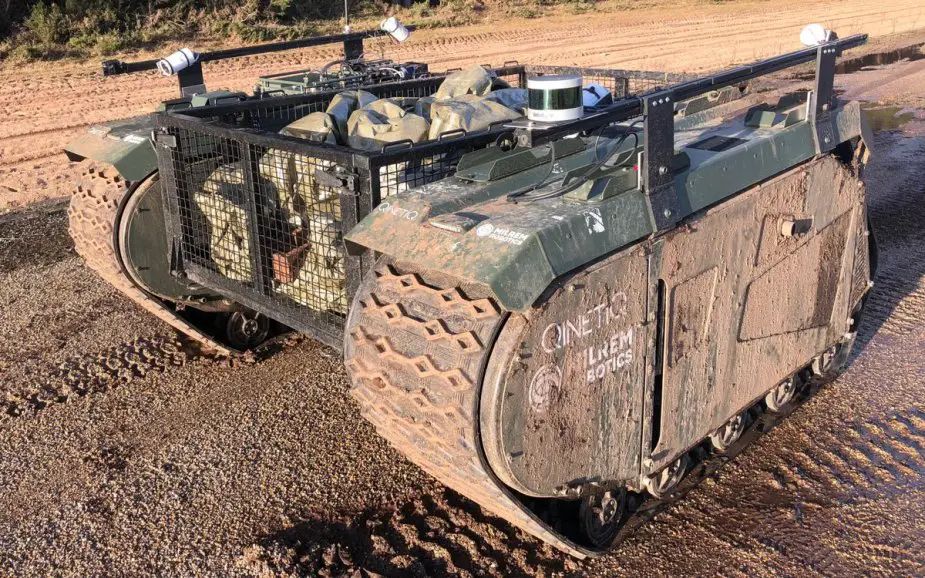Breaking news
Future battlefields will impose more and more autonomy.
Futuristic drones and unmanned ground robots with autonomous ‘deliver to order’ capability could provide timely answers to the vital challenges of access for humanitarian aid and disaster relief in developing countries and future front-line military logistics support.

QinetiQ-led ‘Metis’ team announced as a winner in the Autonomous Last Mile Resupply competition (Picture source: QinetiQ)
In a new cross-government collaboration, the British Ministry of Defence (MoD), the Department for International Development (DFID) and UK Research and Innovation (UKRI) are working together on turning cutting-edge designs for drones and robots into reality. Experts from the Defence Science and Technology Laboratory (Dstl) are leading the partnership as part of MOD’s Innovation Autonomy Challenge, with joint competition funding from MOD, DFID and UKRI being placed through the Defence and Security Accelerator (DASA).
This is the second phase of the competition, which will build prototypes for initial demonstration this year, and is worth a total of £3.8m over the next 12 months. Four of the five successful organisations are British-led, with a wide range of sub-contractors from small and medium enterprises, industry and academia. Winning systems concepts include autonomous hoverbikes, powered paragliders and other unmanned air vehicles, operating alongside self-driving ground vehicles to deliver supplies across difficult, and potentially contested, terrain. Defence Secretary Gavin Williamson said that Defence makes an unrivalled investment in science and technology, creating thousands of highly-skilled jobs and brilliant career opportunities, generating billions for the UK economy. This Autonomous Last Mile competition has seen next-generation concepts from unmanned hoverbikes to powered paragliders come to life. And they could be saving troops’ lives on the battlefield in years to come. I congratulate all those involved in the competition as they ensure our military remain ahead of our adversaries.
Phase 2 has selected 5 bids, led by Animal Dynamics Ltd, Barnard Microsystems Ltd, Fleetonomy, HORIBA MIRA, and Qinetiq, to build prototypes systems for initial testing and evaluation this autumn:
• Animal Dynamics with a system featuring novel autonomous powered paragliders;
• Barnard Microsystems Ltd with Cranfield University developing a vertical take-off and landing unmanned air vehicle-based system;
• Fleetonomy with Thales, Thesigers, Avartek & Callen Lenz to provide a system to demonstrate autonomous networked unmanned deliveries in the urban and other environments;
• Horiba Mira with Frazer Nash Consultancy featuring a highly autonomous all-terrain unmanned ground vehicle using artificial intelligence to provide GPS-denied navigation, advanced terrain perception and object recognition;
• QinetiQ with Hull University, Malloy Aeronautics, MilRem Robotics, Roke Manor Research, Oxbotica, IQHQ Ltd & Aberystwyth University offering an integrated highly-automated logistic system, featuring autonomous hoverbikes and advanced unmanned ground vehicles.
Peter Stockel, Dstl’s lead for the Innovation Autonomy Challenge, said: “For future frontline military operations, the technology could reduce risk to soldiers by removing them from the hazards of frontline logistics resupply and improving the pace of operations”. Lt.Col. Richard Craig, Staff Officer for Robotics and Autonomous Systems, added: “The Autonomous Last Mile Resupply project is looking at the technologies for use in ways that could transform the delivery of logistics in not only Land, but also Maritime operations. It has the potential to reduce the amount of supplies stored at the front line and increase the speed of resupply. There is the potential to increase combat mass as the technology enables the redeployment of current manpower onto different tasks”.
Andrew Tyrer, Challenge Director of Robots for a Safer World Challenge, said: “The increasing amount of work that needs to be done in extreme environments means there are more applications for robotics and A.I., such as hazardous humanitarian aid situations. Solving all these problems presents business opportunities for UK companies. Many of the challenges being addressed via this competition are consistent with those being addressed by the Robots for a Safer World Industrial Strategy Challenge and build on the same underlying technologies.


























